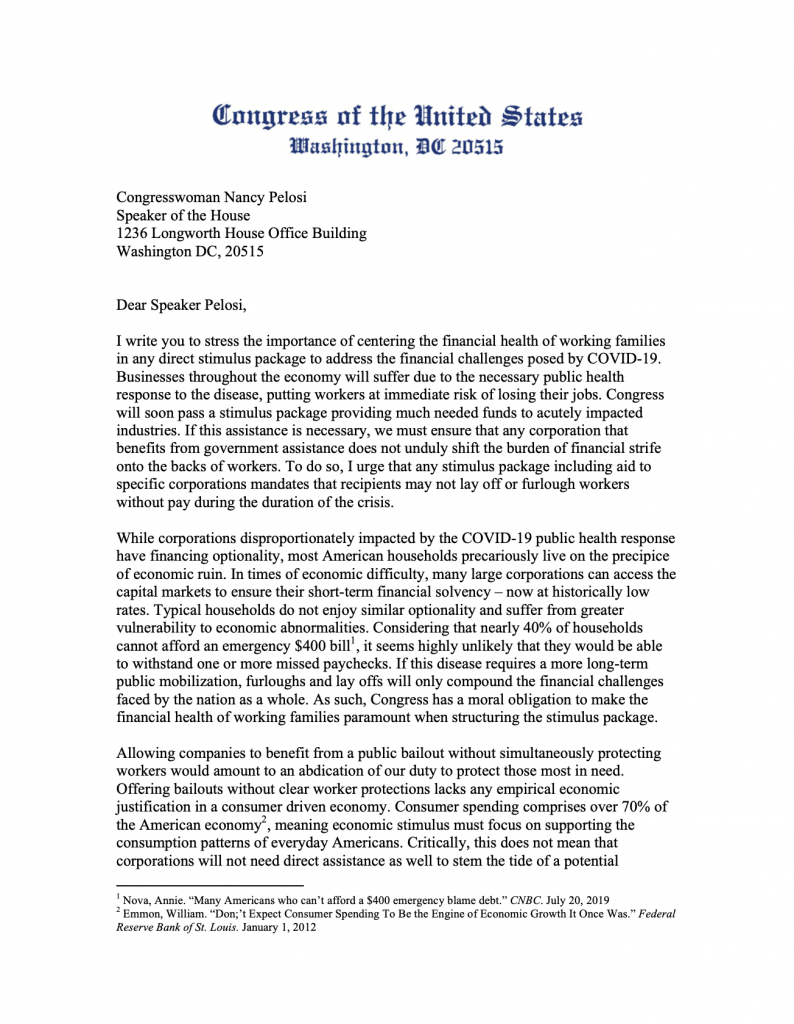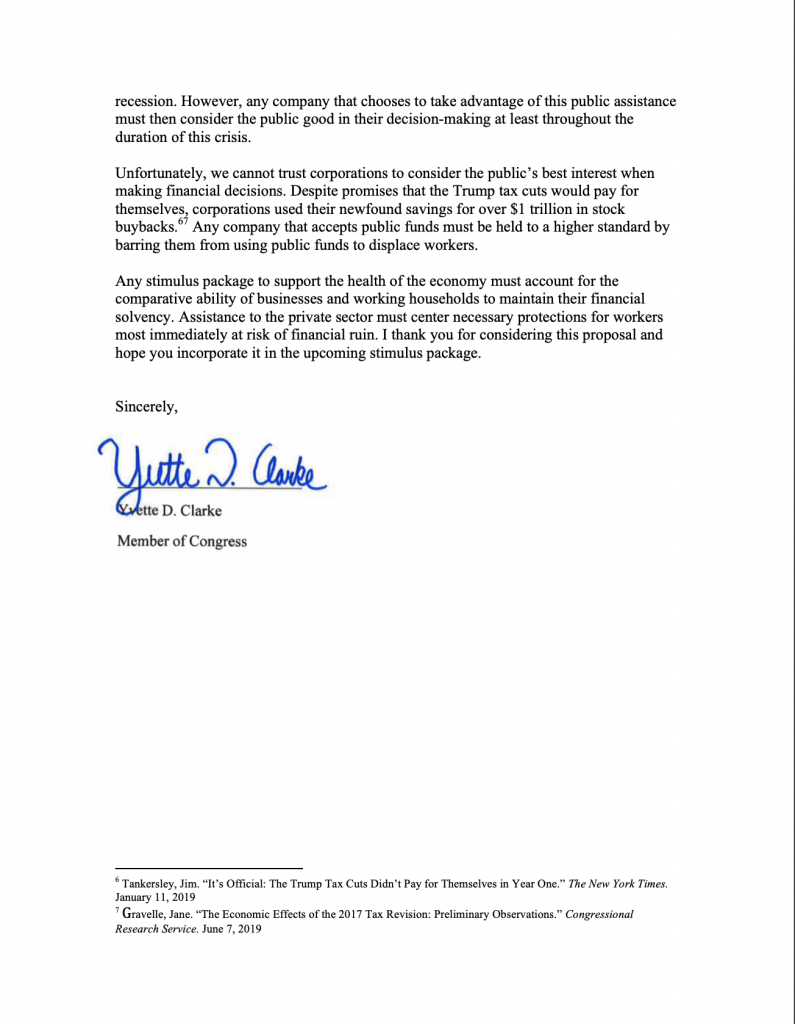Brooklyn, NY – As the nation combats COVID-19, Congresswoman Yvette D. Clarke (NY-09) wrote a letter to Speaker Nancy Pelosi urging the Speaker to consider the needs of hard-working Americans in the upcoming stimulus package by preventing corporations that receive government bailout money from laying off their workers during this time of economic uncertainty.
Clarke’s letter states: “Unfortunately, we cannot trust corporations to consider the public’s best interest when making financial decisions. Despite promises that the Trump tax cuts would pay for themselves, corporations used their newfound savings for over $1 trillion in stock buybacks. Any company that accepts public funds must be held to a higher standard by barring them from using public funds to displace workers.”
The letter specifically calls for no layoffs of workers or furloughed work without pay at companies that will receive government money as a result of COVID-19.
Clarke writes that corporations that are detrimentally impacted by COVID-19 and receive government monies must not “unduly shift the burden of financial strife onto the backs of [their] workers.”
Clarke said: “COVID-19 is throwing life as we know it upside down and during this unprecedented time it’s important to protect our hard-working Americans from losing their jobs, which is why I’ve voiced in my letter to Speaker Pelosi the urgency to protect our workers. As corporations seek bailouts, I urge Speaker Pelosi to make sure the heart and soul of our country, everyday folk who show up to work each day, have a job to come back to when life returns back to normal. It’s only fair to make sure employees at corporations that receive bailout money can come back to work.”
Pelosi along with Democratic committees are currently ironing out the details of what will be included in the stimulus package in response to COVID-19. The Speaker’s stimulus package is intended to be a counter offer to what the Republican-controlled Senate is currently assembling.
A full copy of Clarke’s letter can be found below:
Congresswoman Nancy Pelosi
Speaker of the House
1236 Longworth House Office Building
Washington DC, 20515
Dear Speaker Pelosi,
I write you to stress the importance of centering the financial health of working families in any direct stimulus package to address the financial challenges posed by COVID-19. Businesses throughout the economy will suffer due to the necessary public health response to the disease, putting workers at immediate risk of losing their jobs. Congress will soon pass a stimulus package providing much needed funds to acutely impacted industries. If this assistance is necessary, we must ensure that any corporation that benefits from government assistance does not unduly shift the burden of financial strife onto the backs of workers. To do so, I urge that any stimulus package including aid to specific corporations mandates that recipients may not lay off or furlough workers without pay during the duration of the crisis.
While corporations disproportionately impacted by the COVID-19 public health response have financing optionality, most American households precariously live on the precipice of economic ruin. In times of economic difficulty, many large corporations can access the capital markets to ensure their short-term financial solvency – now at historically low rates. Typical households do not enjoy similar optionality and suffer from greater vulnerability to economic abnormalities. Considering that nearly 40% of households cannot afford an emergency $400 bill[1], it seems highly unlikely that they would be able to withstand one or more missed paychecks. If this disease requires a more long-term public mobilization, furloughs and layoffs will only compound the financial challenges faced by the nation as a whole. As such, Congress has a moral obligation to make the financial health of working families paramount when structuring the stimulus package.
Allowing companies to benefit from a public bailout without simultaneously protecting workers would amount to an abdication of our duty to protect those most in need. Offering bailouts without clear worker protections lacks any empirical economic justification in a consumer driven economy. Consumer spending comprises over 70% of the American economy[2], meaning economic stimulus must focus on supporting the consumption patterns of everyday Americans. Critically, this does not mean that corporations will not need direct assistance as well to stem the tide of a potential recession. However, any company that chooses to take advantage of this public assistance must then consider the public good in their decision-making at least throughout the duration of this crisis.
Unfortunately, we cannot trust corporations to consider the public’s best interest when making financial decisions. Despite promises that the Trump tax cuts would pay for themselves, corporations used their newfound savings for over $1 trillion in stock buybacks.[3][4] Any company that accepts public funds must be held to a higher standard by barring them from using public funds to displace workers.
Any stimulus package to support the health of the economy must account for the comparative ability of businesses and working households to maintain their financial solvency. Assistance to the private sector must center necessary protections for workers most immediately at risk of financial ruin. I thank you for considering this proposal and hope you incorporate it in the upcoming stimulus package.
[1] Nova, Annie. “Many Americans who can’t afford a $400 emergency blame debt.” CNBC. July 20, 2019
[2] Emmon, William. “Don;’t Expect Consumer Spending To Be the Engine of Economic Growth It Once Was.” Federal Reserve Bank of St. Louis. January 1, 2012
[3] Tankersley, Jim. “It’s Official: The Trump Tax Cuts Didn’t Pay for Themselves in Year One.” The New York Times. January 11, 2019[4] Gravelle, Jane. “The Economic Effects of the 2017 Tax Revision: Preliminary Observations.” Congressional Research Service. June 7, 2019
[4] Gravelle, Jane. “The Economic Effects of the 2017 Tax Revision: Preliminary Observations.” Congressional Research Service. June 7, 2019


